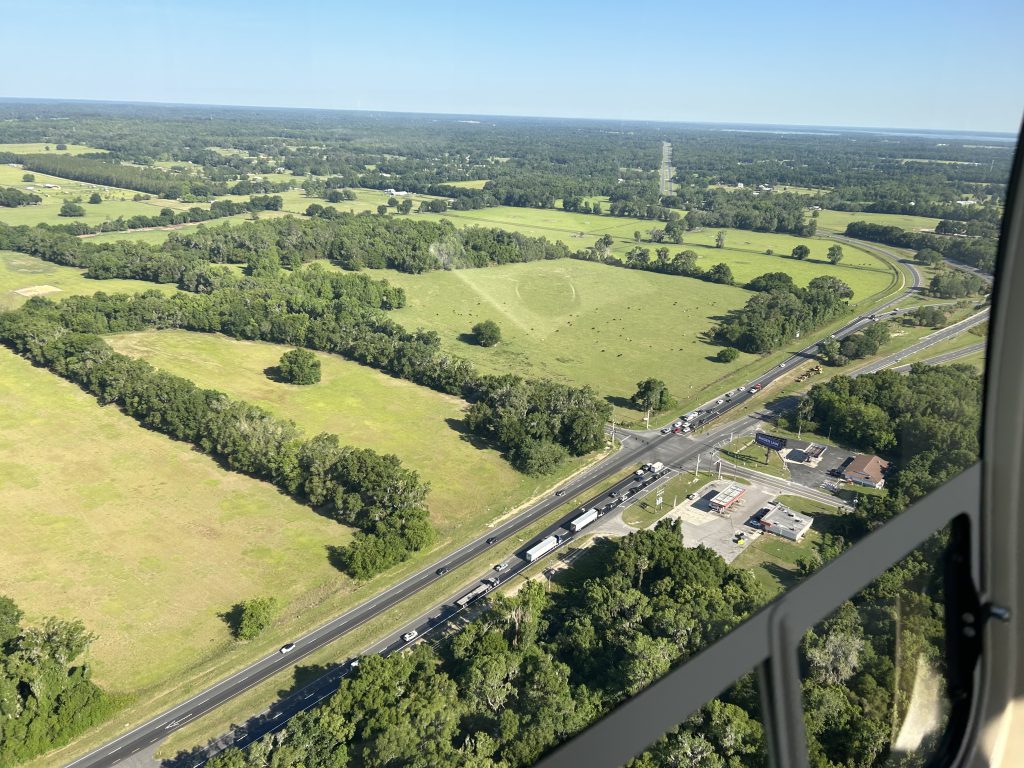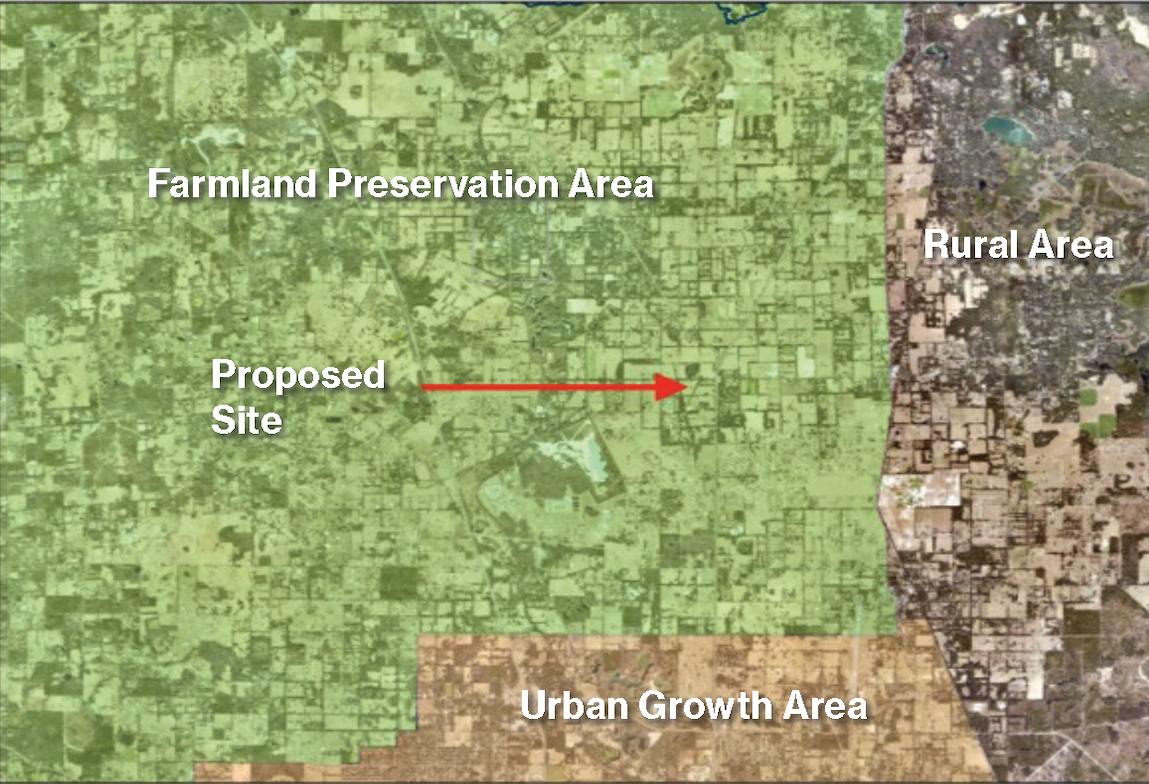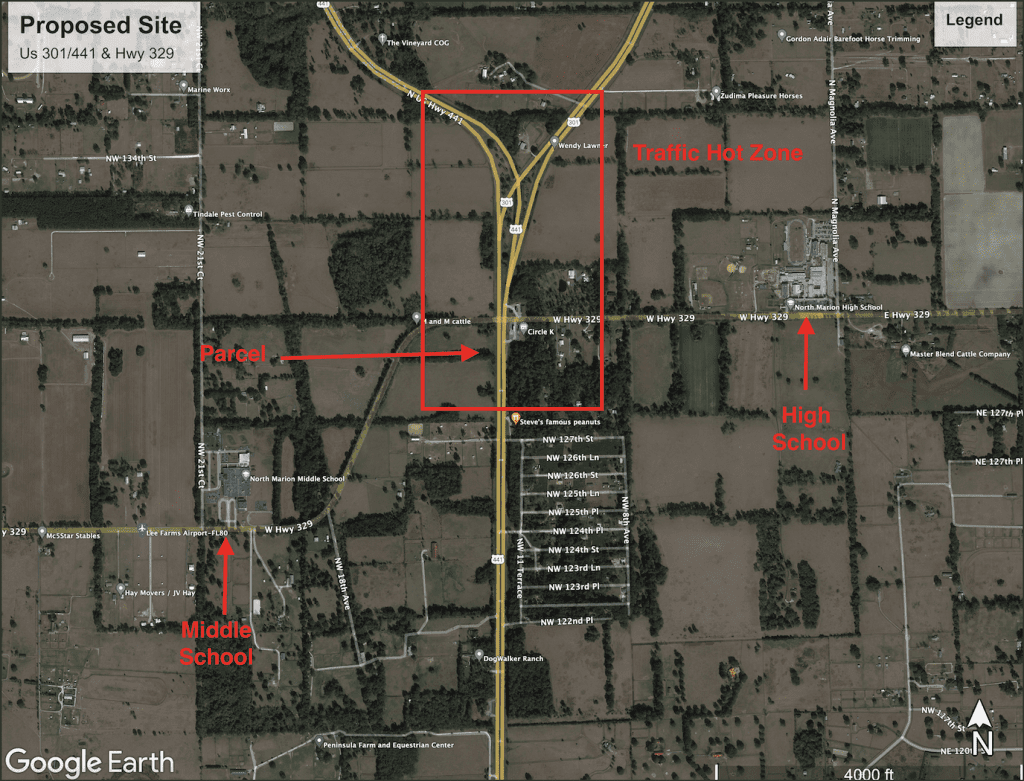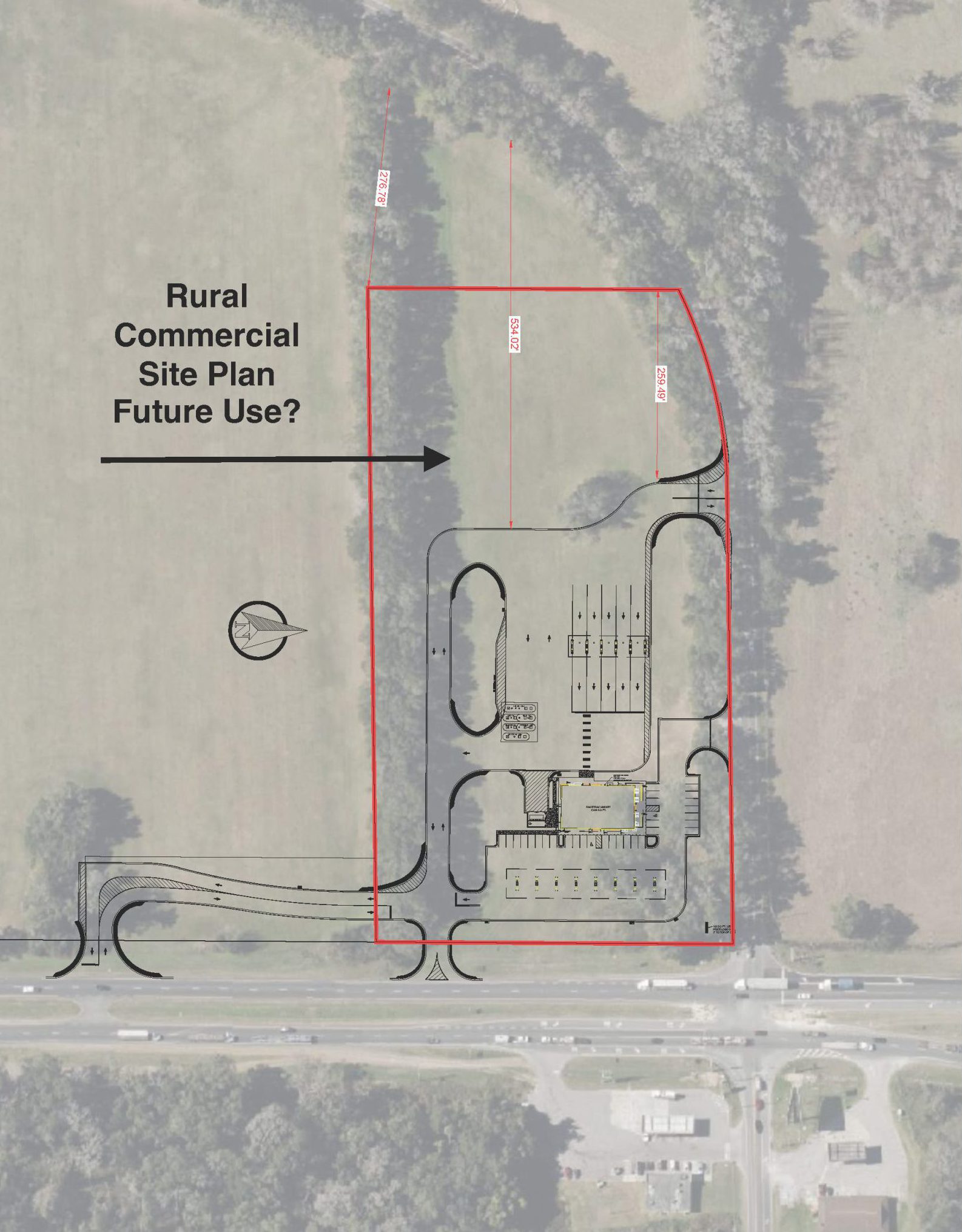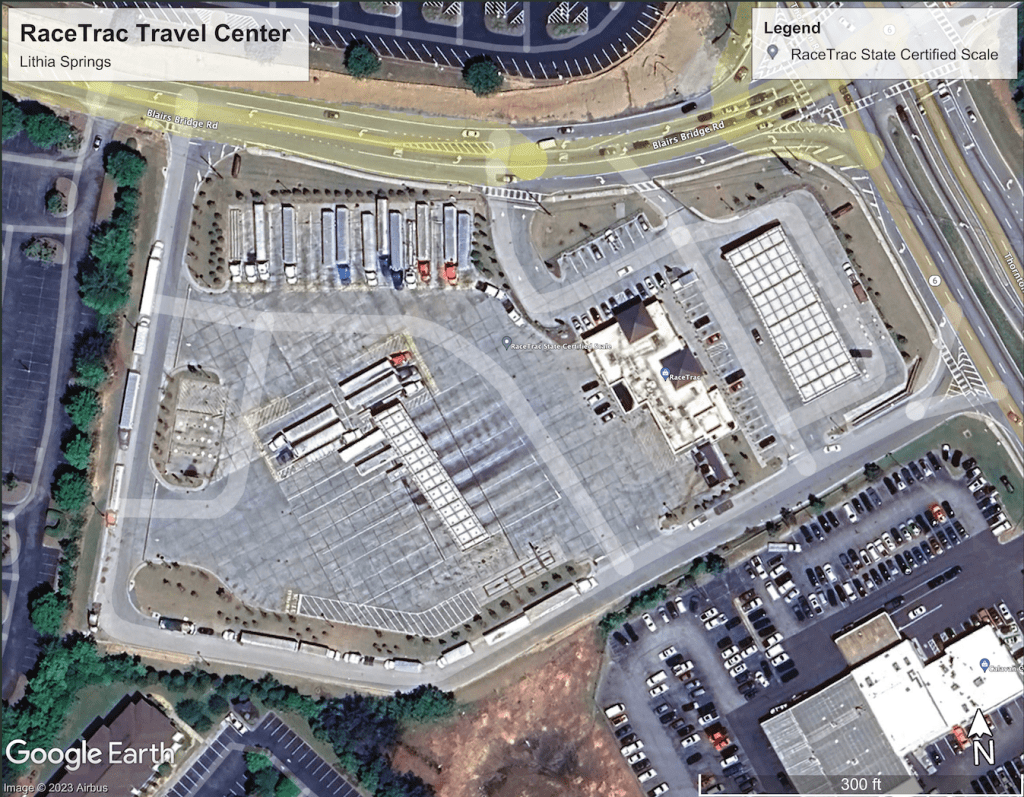RaceTrac has applied to build a truck stop deep inside the Farmland Preservation Area. The County says truck stops are not compatible on agricultural land, so RaceTrac has applied to change the zoning and made some modifications to the plan so that it looks more like a gas station. It’s a shenanigan! Like a wolf in sheep’s clothing, RaceTrac is hoping that the disguise will get them in the gate. Once they’re in, the incremental change to a full-scale truck stop will be hard to fight. Let’s take a closer look at this “sheep-nanigan” so we can see the teeth and claws hidden under the fluff.
The Shenanigan
The site is at the intersection of 329 where it meets 301/441 just before the “Y” where 301/441 split in northwest Ocala. It is right near both the North Marion High and Middle schools. You can see that the area is predominantly large, open pastures. It is a quiet rural neighborhood with one exception. The convergence of 301 and 441 creates a high traffic count.
Especially for trucks headed to and from Jacksonville.
RaceTrac has applied to rezone an agricultural parcel in the FPA to Rural Commercial, a restricted, specialty classification. Rural Commercial is only available to legacy commercial parcels that are agricultural related and appropriate on Rural Lands.
Perhaps you’ve never heard of Rural Commercial zoning – seems like an oxymoron! Is it rural or is it commercial? It’s understandable if you have never heard of it. Of the 281,000 parcels in the County, only 20 have this legacy zoning. That’s just 0.007%.
According to our research, no one has ever applied to rezone a parcel with Rural Land use from Agricultural to Rural Commercial … until RaceTrac.
Truck Stops are not allowed in Rural Commercial zoning. So, RaceTrac is calling this project a “rural agricultural convenience store and gas station.”
The Disguise
How do you make a truck stop look like a gas station?
RaceTrac’s answer is to remove the semi-truck parking, but keep the semi-truck fueling lanes. Take a look at this site plan. The gas pumps are in the front and the diesel truck lanes are in the back. If you’ve ever been to a truck stop, you’ll recognize the pattern.
When’s the last time you saw a truck stop with semi-truck fueling lanes but no semi-truck parking? They have to park somewhere, even temporarily, and they will. On all that space in the back.
How long will it be before that open space has semi-trucks parked on it? Who will be able to stop it then?
My What Big Teeth You Have
Truck stops depend on traffic to make a profit. Look at what grew up around a similar RaceTrac in Lithia Springs, Georgia: big box stores, distribution centers, fast food, you name it. If RaceTrac is allowed to use Rural Commercial zoning, then the sky’s the limit for a commercial invasion of the Farmland Preservation Area.
If this truck stop is “agricultural related and appropriate for rural lands” then what else will developers argue for? A Bucc-ees on the opposite corner? A Walmart? How much farther behind are a wider road, faster speeds, on- and off-ramps, and lighting 24/7? URBAN SPRAWL is knocking on the door.
A Break in the Fence?
In order to get to the sheep, this wolf has to clear some hurdles. The first hurdle is the restriction to agricultural related commercial uses.
Is a RaceTrac truck stop an agricultural related use? Of course not! The USDA says “agricultural related use” means lands, buildings, or structures, used, designed, or intended for use for the purpose of a bona fide farming operation.
Selling salads does not make it agricultural. Providing diesel fuel for off-road vehicles doesn’t make it agricultural. There are already two small, legacy-zoned gas stations in that area to serve that need.
The second hurdle requires the use be appropriate on Rural Lands.
Is a truck stop appropriate on Rural Lands? The Marion County Comprehensive Plan says no! That’s abundantly clear.
The third hurdle is that all undeveloped commercial parcels located in the Rural Lands shall rezone to Rural Commercial.
The RaceTrac parcel is an undeveloped agricultural parcel. It does not qualify for the Rural Commercial zoning.
It should take some fancy footwork to get past those first three hurdles addressing the intent of the Rural Commercial zoning classification, but if RaceTrac clears those, the fourth hurdle is permitted uses.
If you are agricultural related, appropriate on rural lands, and an undeveloped commercial parcel, then convenience store/gas station is a permitted use. Truck stops are not a permitted use. The Land Development Code says truck stops are not permitted on Rural Lands.
If RaceTrac can convince the County that they meet both the intent of the classification and the permitted use, they will face the fifth and highest hurdle: the Comprehensive Plan.
All Zoning Changes and Special Use Permits within the Farmland Preservation Area must be consistent with and preserve, protect, support, and enhance the rural, equestrian, and farmland character of the Farmland Preservation Area.
A truck stop does not clear this hurdle.
Common Sense
If it walks like a truck stop, quacks like a truck stop and acts like a truck stop, it’s a truck stop! Our County has done good work to protect the Farmland Preservation Area through zoning and the Comprehensive Plan. Because it can’t undo those protections, RaceTrac is seeking to find and exploit a loophole.
It’s a sheep-nanigan. We hope you don’t fall for it.
Don’t let RaceTrac pull the wool over your eyes.
RaceTrac’s application for zoning will face a public hearing on March 19th. We urge you to show up along with us and exercise your right to public comment. Please also reach out to your County Commissioners to thank them for their longstanding support for farmland preservation and ask them to continue to uphold the Comprehensive Plan’s protections for the Farmland Preservation Area. Your voice matters and it makes a difference.
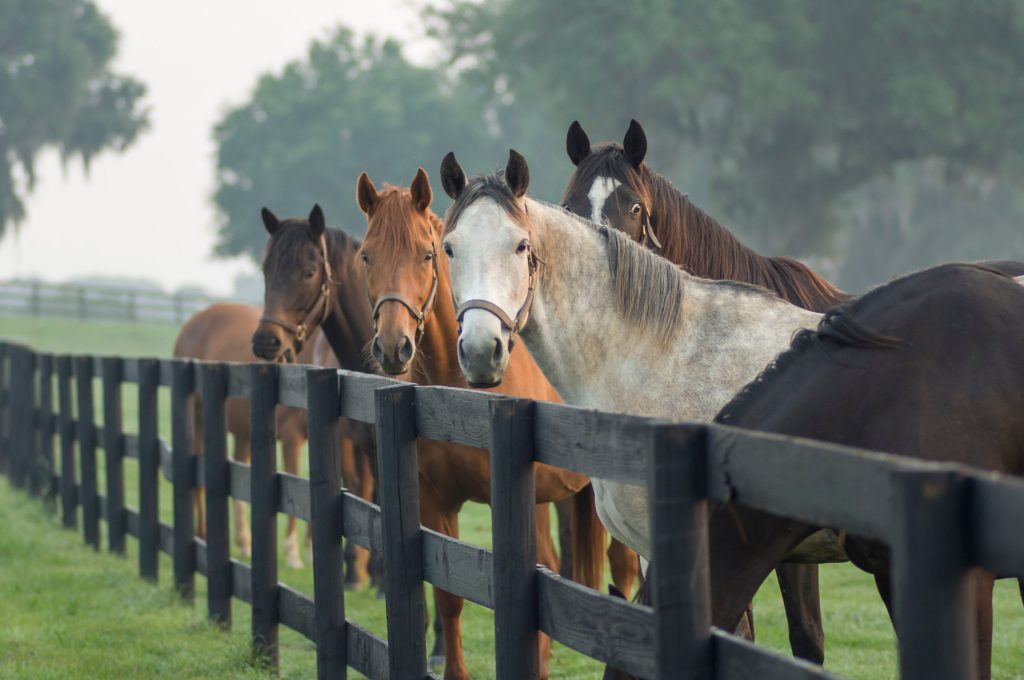
It is the vision and mission of Horse Farms Forever to inspire conservation of horse farms through education, awareness and idea exchange so as to preserve natural pasture land focusing on horses and their habitats, to protect soil and water on which they depend, and minimize land use conflicts
in Marion County, Florida.
We are watchful of government and others to preserve and protect horse farms and farmland for future generations - especially in the Farmland Preservation Area. We are neither anti-growth nor anti-development; we encourage urban growth to remain inside the Urban Growth Boundary.
Horse Farms Forever® is a Florida not-for-profit corporation registered with the Florida Department of Agriculture and Consumer Services as a charitable organization and approved as a tax-exempt 501(c)(3) corporation by the Internal Revenue Service. Horse Farms Forever® does not have a political mission. Our status as a 501(c)(3) charitable organization does not allow us to participate or intervene in political activities. The organization will neither advocate on behalf of political candidates nor advocate for the passage of legislation.


